Thomas E. Ricks's Blog, page 196
March 8, 2012
J. Wing claims Iraq is not getting more violent, but J. Mattis sounds not so sure

Here is the latest
from Joel Wing.
But General James Mattis, the head of Centcom, appeared last
optimistic in his testimony to the Senate Armed Services Committee on Tuesday.
Asked by Sen. John McCain if al Qaeda is making a comeback in Iraq, Mattis
said, "Yes, sir, notably in the western Iraq area. But the threat is extending
into Baghdad." Returning to the subject later in the hearing, he added, "It's
not significant. It won't threaten the government. It'll kill a lot of innocent
people."
Mattis also sounded quite dovish on Iran. "…[T]he best
we can do…is to delay them. Only the Iranian people can stop this
program."
I was also struck that General Dempsey, the chairman of the
Joint Chiefs, in his own Senate testimony yesterday commented that Syria's air
defense system is "approximately five times" more sophisticated than those NATO
aircraft faced in Libya.
Is that called burying the lede?
Quote of the day (II): Joseph Alsop on the qualities of General MacArthur's staff
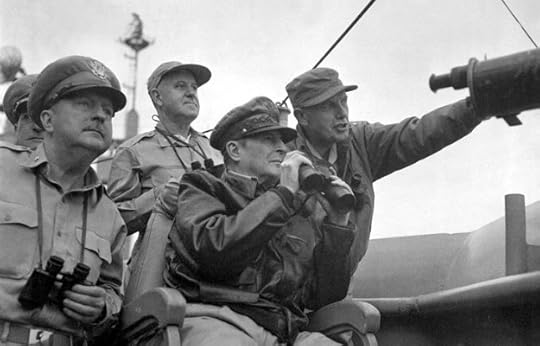
As for MacArthur's staff in Tokyo, with which he dealt
during the Korean War, the columnist Joseph Alsop wrote in his memoirs, I've
Seen the Best of It: "For the
most part, they were insipid men, arrogant with the press, wary of each other,
and generally incompetent." (p. 323)
(Another HT to RLG)
Saigon update: Today's motorcycles are scarier than the Commies were back then
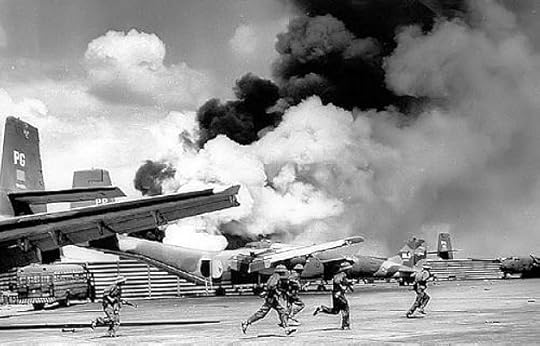
By Charles Krohn
Best Defense bureau of Vietnamese affairs
As I flew out of Ton Son Nhut in the fall of 1971, I
harbored no intention of ever visiting again the war-ravaged nation where I served
faithfully for two years. But when my wife and I landed two days
ago on a round-about-way to Angkor Wat, we were instantly
surrounded by luxury at the five-star Hyatt. So I forgot about the
war and ordered club soda to mix with the duty-free Scotch I picked up in Hong
Kong.
The next day we explored the city looking for some vestige of the war. The
traffic was so terrific I felt I was more likely to be killed by a motorcycle now
than I was by a bullet back then. Apart from a couple of war
marble memorials the victors erected to celebrate their success in
1975, the only evidence of a U.S. presence was a garish sign atop
the Rex Hotel promoting it was "the site of the 5 o'clock follies."
A few blocks away we found the U.S. consulate, formerly our embassy.
Far more conspicuous was expansion of the city. When I left the airport was
well outside the city limits. Now it's surrounded by new construction to
help house the population of about 10 million. The city has grown so far, in
fact, it reaches the Cambodian border maybe 20 miles to the west in what
we knew as the Parrot's Beak. Where the border market once
flourished is a cluster of new supermarkets. When William Colby once
visited me at Go Dau Ha, the district capital, his only request was
to visit the market where I supposed both sides exchanged intelligence. I
used to buy Vichy Water by the case to keep my upset stomach under control.
On the Cambodia side is a casino complex servicing Vietnamese
gamblers who can't work the tables legally in their own country. At least
that's what my guide said. He also explained the Cambodia relaxed visa
requirements, but only for Vietnamese.
When he told me that the Vietnamese Army was small, only 650,000, I
was thinking we might ask them to send a division or two to
Afghanistan, given the absence of any local threat.
Overall, Vietnam today is one of the world's most energetic engines of
change, in my opinion. There is no easy way to describe the
motion. I told my guide that I found it ironic that there was more capitalism
than socialism in Vietnam. One might even argue there is more socialism in
the States with welfare programs that don't exist here. Anyone can get a
license to start a business in a week, I was told, and if it failed,
tough luck. It was like the American frontier, without the guns.
I didn't probe into the political situation, but I was told that about one
million Vietnamese moved south after the war was over. Everyone has a
computer and access to TV, but no satellite dishes are allowed. Also, I am
told, Facebook was blocked a few months ago. I'm sure the kids know how to
work around this, but it didn't seem prudent to tell my guide that traditional
methods of thought control by elderly males are simply irrelevant. I had
experiences in Baghdad not too long ago that suggest we haven't learned all the
lessons either.
Tomorrow we fly to Hue where I will visit the site where my battalion was
surrounded by the NVA during Tet '68. I'm hoping I can find it.
Charles A. Krohn is the author of The Lost Battalion of Tet. Now retired to Panama
City Beach, Florida, he served in Iraq in 2003-2004 as public affairs adviser to the director of the Infrastructure Reconstruction Program, and later
as public affairs officer for the American Battle Monuments
Commission.
March 7, 2012
Romney endorses Obama: Yep, I'd do almost exactly what he is doing on Iran
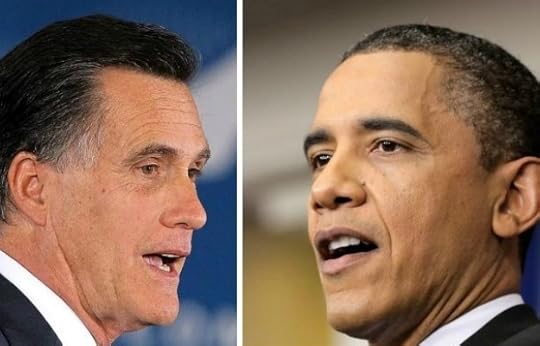
That was my takeaway from Romney's op-ed
article in yesterday's Washington
Post on how he would handle Iran. The policy he recommends is
extraordinarily close to what Obama is doing and saying.
The only difference I see is that Obama
knows more about Iran than Romney does. Like history? "Ronald Reagan made
it crystal clear that the Iranians would pay a very stiff price for continuing
their criminal behavior," writes Gov. Romney. If I were a Republican, I
wouldn't be recommending Reagan's handling of Iran as the model, unless the
moderate Massachusetts millionaire wants to endorse giving Iran more weapons in
exchange for the release of hostages, as of course the Reagan Administration
did.
But the stupidest line in the article might be this one: "I
will press for ever-tightening sanctions, acting with other countries if we can
but alone if we must." Dude, how are sanctions gonna work if we impose them
alone? They won't, so they must be imposed multilaterally. Which is what
President Obama
happens to be doing. I have to wonder who in the Romney campaign thought this
article was a good idea.
Meanwhile, I suspect that one thing Republican hawks don't
understand is the
depth of opposition inside the military to attacking Iran. (Of course, back
in 2002-03, lots of people in the military were against attacking Iraq-but the
administration back then was all hot to trot, and did not want to be confused by
facts.)
Here is what old Obama said yesterday at a press conference
about all this:
When I see the casualness with which
some of these folks talk about war, I'm reminded of the costs involved in
war. I'm reminded that the decision that I have to make in terms of
sending our young men and women into battle, and the impacts that has on their
lives, the impact it has on our national security, the impact it has on our
economy.
This is not a game. There's
nothing casual about it. And when I see some of these folks who have a
lot of bluster and a lot of big talk, but when you actually ask them
specifically what they would do, it turns out they repeat the things that we've
been doing over the last three years, it indicates to me that that's more about
politics than actually trying to solve a difficult problem.
Now, the one thing that we have not
done is we haven't launched a war. If some of these folks think that it's
time to launch a war, they should say so. And they should explain to the
American people exactly why they would do that and what the consequences would
be. Everything else is just talk.
Alleged rapes at the Marine barracks at 8th and I, and the fallout for a Marine
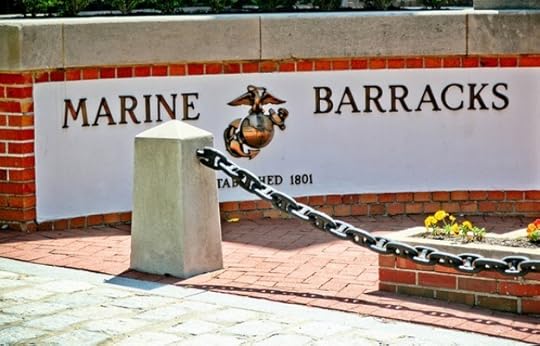
A former Marine officer I know writes:
Ariana
Klay is a Naval Academy grad, the daughter of an enlisted Force Recon dude and
old friend of mine. She is the woman I mentioned last year who contacted me for
help after she was raped.
8th and I was a mess. The rape was a culmination of a
very bad command situation. She's not a perfect victim. She'd gotten back from
Iraq and landed in a bad command. She dealt with her problems by drinking.
After a night of drinking, a LCPL at 8th and I
called her a whore and she slapped him. After the rape, she downed a bottle of
sleeping pills and all the alcohol she could get her hands on and tried to kill
herself. She pulled though and contacted me after she got out of rehab. I told
her they probably wouldn't prosecute and she could expect reprisal. I was
right. They didn't file charges against her attacker until after she went to
the press…She was kicked out because of the slapping incident. I
think her
lawyer's keeping a tight rein on her press
interviews.
I felt bad about telling her to let it go and not go to the
press, but I knew that the folks at 8th and I would bury it. The whole thing is
a damn mess. The worst bit: the Capt who did it was investigated for war crimes
in Iraq. After the attack, he told her that his company motto was that
"Snitches end up in ditches."
A young singer salutes the Navy

Last night I was at a concert by Ruthie Foster, a terrific young R&B
singer from Texas -- think Norah Jones meets Lyle Lovett, with a bit of Cassandra
Wilson and the Blind Boys of Alabama mixed in. In the middle of it she gave a
shoutout to the Navy, mentioning that she'd served four happy years in it. This
was the first time I'd heard something like that from a young performer of
popular music. It made me think that Jimi Hendrix never gave a shoutout to the
101st Airborne -- but of course he got himself discharged after a year.
March 6, 2012
'Soldiering On in a Dying War': How bad was our Army late in the Vietnam War?

William Shkurti's Soldiering
On in a Dying War: The True Story of the Firebase Pace Incidents and the
Vietnam Drawdown is one of the more interesting books I've read
in awhile.
Essentially, his argument is that while the U.S. Army in
Vietnam had troubles in 1970-72, it wasn't nearly as bad as it has been
portrayed. He makes his case well, with extremely fine-grained portrayals of
units and combat at the time. (At one point, we even get an account done mortar
round by mortar round.)
"There was a problem with drugs and fraggings," he concedes.
"Motivation did become more difficult as the war wound down. People in the
lower ranks were more willing to challenge authority. But what…these
analyses overlook is how both officers and enlisted men, regardless of how they
felt about the war, struggled but managed to hold it together without much help
from anywhere else."
But. But…the
evidence he introduces in defense of the quality of the soldiers of the time
frequently is hair-raising:
-- A squad ordered to set up a night ambush along a part of
the Cambodian border crawling with both North Vietnamese and South Vietnamese
units has six men who have never before been in combat? Yow. That's a recipe
for fratricide, or losing the whole squad.
--Another question about leadership: A unit that had refused
to go on patrol in an area because its members worried there were unmapped
Claymore mines in the area finally is persuaded to go-and finds loads of
Claymores. The lieutenant colonel commanding in the area reports around this
time that morale is "uniformly high."
--Speaking of which, Shkurti assures the reader that "only
4.5 percent of Army soldiers in Vietnam GIs were hard-core heroin users." Only? You don't need all the soldiers in
a unit to be ill-disciplined or stoned for the unit to go rotten. Imagine how
one stoned guy, stumbling along, or laughing and jiving, could foul up a combat
patrol. Or fall asleep on sentry duty. Let's see: 4.5 percent of a platoon is
on heroin. Others are smoking dope. Some are ill-disciplined. Are you going to
sleep well?
Also, it doesn't seem right to me for the author to consider
an incident as not a combat refusal if the order in question is subsequently
rescinded (which both he and the Army of the time seem to think is just fine).
What a great way for a commander to keep his unit record "clean" while letting
his soldiers pick and choose their missions.
At times, the book felt to me like someone arguing an
airline is a lot safer than it looks because only 10 or 15 percent of its
planes crashed last year. Sure, 85 percent did just fine. But that is not what
worries me.
So why do I like the book? Because it made me think, on
almost every page. It mounted a clear and consistent argument that made me
re-examine the evidence and to re-consider what I think I know (and what I have
written in the book I am working on). Also, while I disagree with a lot of the
book, I got the sense that his heart is in the right place, and that matters to
me. He is struggling to make sense of what happened in that war. So am I. We are all pilgrims on this
road, boys.
Bottom line: This might be the best book I've read on the
last part of the American involvement of the war (though it has been many years
since I've read James McDonough's Platoon
Leader, which I will go back and
look at again soon).
A Syrian-American considers the Syrian insurgency and the American imperative
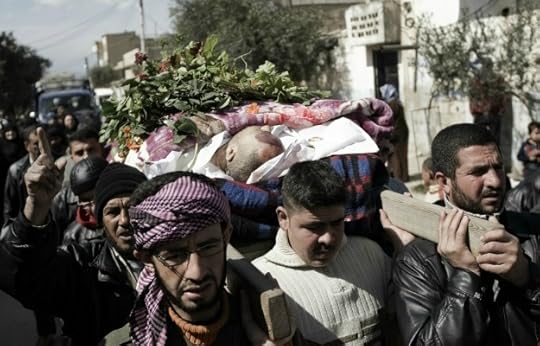
By
"A Syrian-American"
Best
Defense guest column
The
Bashar al-Assad regime now faces itself with the dilemma of quelling a quickly
proliferating armed insurgency that has fused with a popular uprising. Cities like Homs, Zabadani, Rastan, and Idlib
have become modern day ghettos, sealed off by special task forces of elite
units and paramilitary squads specifically recruited to cleanse
neighborhoods and towns
of those who dare to resist the Baathist diktat.
By
many definitions, Syria has become ensnared in a full-fledged civil war. But beyond the narrative of internal strife,
when one takes a careful look at a map
of where the uprisings are taking place and the towns that have effectively
ceased to recognize the government, a competing narrative emerges not of internecine conflict but one of national
unity -- a whole country that has been brought together in opposition to the
Assad family's self-declared right to rule.
The people in this archipelago of resistance
cling to a hope -- perhaps foolishly -- that their cause will win the day. Like any illegitimate occupational force, the
Assad loyalist army can only control the ground occupied by its Soviet-era
tanks. Take out the saturation of
paramilitary, heavy artillery, and special forces units in the cities, and the
popular rebellion will reach critical mass.
For Syrians attempting to survive, there is no
illusion of life under the Assad tyranny. The executions of captured defectors, and the
past executions of leading non-violent activist heroes like Ghaith Mattar
speak to the reality that there can be no reconciliation with the mass
murderers of the Baath Party.
The
delusions of dialogue and a negotiated settlement with the Assad apparatus have
long faded. One cannot negotiate, let
alone reason, with a government that makes mass killings its domestic
policy. In every way, the ideology and
the solution being employed by Bashar al-Assad and his confidants are
neo-fascist in function and form.
Reaching
the tipping point to this conflict will require a determined shove by the
international community. There are
broader regional interests in play, and a rebel victory can prove to be a
damning blow to Iranian hegemonic aspirations that have claimed the lives of
freedom-seeking Syrians in addition to the Americans who have fallen victim to Iranian-supplied
weaponry throughout the region. The rebels now
claim that they are fighting the same Hizballah and Iranian revolutionary
guard forces in Syria that have wrought so much havoc across the world for the
West.
Hundreds
of civilians have needlessly died since U.N. Human Rights Commissioner Navi Pillay's
presciently warned the U.N. General Assembly that the ongoing assault and
shelling by Bashar al-Assad's forces against the city of Homs presented a
"harbinger of worse to come." Among the dead are journalists
who perished attempting to show the world just how real, and how tragically
correct, Pillay had been -- and just how wrong the assembly of global leadership
have proved in their stupor.
To
further punctuate the consequences of paralysis, Pillay rightly cautioned the
General Assembly that the failure of the U.N. to enact "collective
action" was actually "emboldening" the Assad regime to escalate
the violence against his own people. Since
the U.N. human rights report presented by Pillay was published, the regime,
sadly, has launched a second concerted campaign to retake rebel-held territory
in the north while simultaneously pouring hundreds of tanks and infantry
fighting vehicles into the strategic mountain town of Zabadani on the Lebanese
border.
By
the time you read these words, more cities will have come under siege. Hoping that the world will see them, the
residents of the town of Ar Rastan, an essentially liberated town, have written
in large rock formations the words "S.O.S," hoping that they would be
seen from the sky. Their eyes turn
upwards not just in the hope of salvation from the
nightmare that many are now living, but in the desire for a lifeline that
provides support beyond tired platitudes.
The
U.S. State Department even published satellite
imagery of the formations of artillery batteries and tanks that are
pummeling cities en masse. Perhaps it
was done to shame the regime and its allies. The real shame is now borne by
those who watched those armor columns and the screaming 120 mm shells slam into
the homes of the innocent -- and did nothing.
The
imperative for bold American action has never been stronger. While the Qataris
and the Saudis
have openly called for the funding and material aid of the rebels, the Turks
have made it clear that they are not willing to go all in without some degree
of U.S. backing. As uncomfortable as it
may be, an end-game in Syria will require a level of U.S. involvement, whether
be it direct or through an indirect approach.
Moral
clarity can be best guided by this realization: this regime has concluded that in order to control the ghettos that have
risen against it, they must be razed. The late Hafez al-Assad did this to one
city in the past, Hama, that rebelled against his authority in 1982. Today, the younger Assad faces many more situations,
and is displaying an equal determination to destroy them all.
And
so the world now has a front-row seat to the play-by-play gradual demolition of
homes, neighborhoods, and of whole families -- their liberation cut short by a
vengeful, cruel, and cynical regime. The
aftermath, as it were, is already visible for all
to see in horrid detail. Yet western leaders continue to balk at taking a
bold position, fearing that supporting the rebels in any form could somehow
enable religious extremists and Al Qaeda.
Secretary
Clinton was wrong
when she suggested that supporting rebel forces could benefit al Qaeda. Yes, it is true that al Qaeda's leader Ayman
Zawhiri declared his solidarity with the rebels and called on jihadis to
support their cause. But in his distant
Waziristan cave, the disconnected Zawhiri is a feckless general commanding
phantom legions. There is no room for an
Islamic Emirate in Syria. Liberation is not a slippery slope to rule by the
clerics. The fighters are not looking to
replace a mustached dictator with a bearded one. The Muslim Brotherhood is widely viewed in
suspicion by the revolutionary councils and rebel fighters alike. It makes little sense to cede the ground to
the jihadis in Syria when their program carries little credibility among the
rebels and the majority Sunni Arab populace. It will be municipal elections and
the desire to reawaken a civic involvement that is truly invested in their
country's future that will occupy the daily concerns of Free Syrians -- not the
resurrection of the caliphate.
The
end of the Assad regime will not immediately usher in a grand new era of democracy
and functioning governance, but the sooner the first steps are taken towards
this transition, the more any negative fallout can be mitigated and safely
contained. This will be good for Syria,
the region, and more broadly Western interests.
To
achieve their vision for victory, from Homs to Deraa, the revolutionary
councils that guide the day-to-day insurrectionist activity and the rebel
networks they support are looking to the U.S., EU, and the Gulf countries for
aid. There is growing disillusionment of
the timid international response and of the apparent lack of willingness by the
West to support the revolution. According to rebel reports, even those Syrians who volunteered to fight
U.S. forces in Iraq have expressed their support for receiving American aid to
fight the regime.
Some
Western
commentators have opined that opposition groups on the ground are
disorganized and incapable of overthrowing the regime. They are wrong. The capability to take on Assad forces exists
and the possibility of a rebel victory is real, but this outcome becomes more
realistic in the near future if enabled and supported with material aid.
The
rebels have proven their bona fides; regime security forces even with
overwhelming firepower took weeks before they could enter the Baba Amr
neighborhood in Homs -- and that's just one neighborhood. As any rebel force does, the one in Syria fights
and retreats and fights again as it gathers additional strength from its
popular support. But there are no
Benghazis here. Alone they can at best put forth a heroic stand that will lead
to a prolonged stalemate. With aid, they
can end the violence, and the Assad-sponsored killing fields, by ending the
regime.
Quote of the day: Joseph Alsop slams the Joint Chiefs of Staff for their 'ass-kissing'

Joseph Alsop is forgotten now, but he was a big noise in
Washington journalism in the 1940s and 1950s, even into the '60s. In his
memoirs, I've
Seen the Best of It, this is his
comment on the nation's top military men: "The Joint Chiefs of Staff-a group who, in my opinion, cannot be matched
for arrogance when the wind is blowing their way or for a quality of abject
ass-kissing when it is not." (p. 300)
(HT to RLG)
March 5, 2012
Vietnam, Iraq, Afghanistan: Comparing memoirs of small unit ground combat
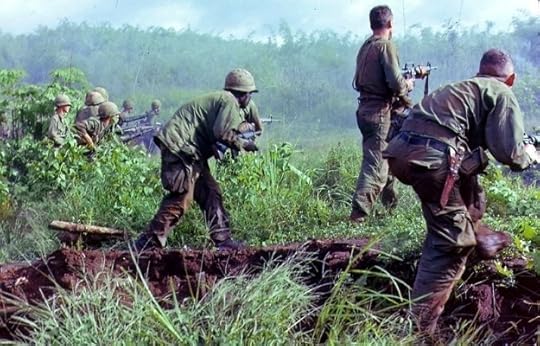
A reader writes from one of our formerly rebellious southern
states:
I have consumed a fair number of 1st-hand (usually company/platoon level) accounts of Vietnam, Afghanistan and Iraq combat (currently reading Outlaw Platoon). While reading your post today on the Vietnam war, I had a thought/question -- are you aware of any papers, articles, or books that research the ground combat experiences in each of these conflicts, and seek to specifically compare and contrast the experiences of small unit leaders (lieutenants and captains)?
I would love to see the results of solid research of selected first-hand accounts (like Outlaw Platoon and Platoon Leader: A Memoir of Command in Combat) to see what was similar, what was different, what were the unique challenges in each conflict, what worked in one conflict that did not work it others, what worked in all three conflicts, etc. I can imagine that this research would not only be extremely interesting reading, but could also benefit our young commanders in the field today, and those who will be in the field in the future.
I think reading all the memoirs of platoon and company
command or enlisted service during the three wars, and then looking for commonalities
and differences, would make a fine master's or even doctoral dissertation for
someone.
I've mentioned in the past that one of the striking things
to me about the Iraq and Afghanistan wars has been that the accounts by
enlisted soldiers and younger officers have been much better than those by
generals. And more intellectually and morally serious -- just line up the books by
Fick,
Exum,
Bellavia
and Mullaney
against those by Franks, Sanchez, Bremer, Rumsfeld and Feith.
By contrast, I can think of five good books by generals
about Vietnam: Those by Bruce
Palmer, Dave
Richard Palmer, Ray
Peers, Douglas
Kinnard and (cheating a bit, since even though he is now a general he wrote
it as a captain) Herbert
R. McMaster.
Thomas E. Ricks's Blog
- Thomas E. Ricks's profile
- 436 followers



